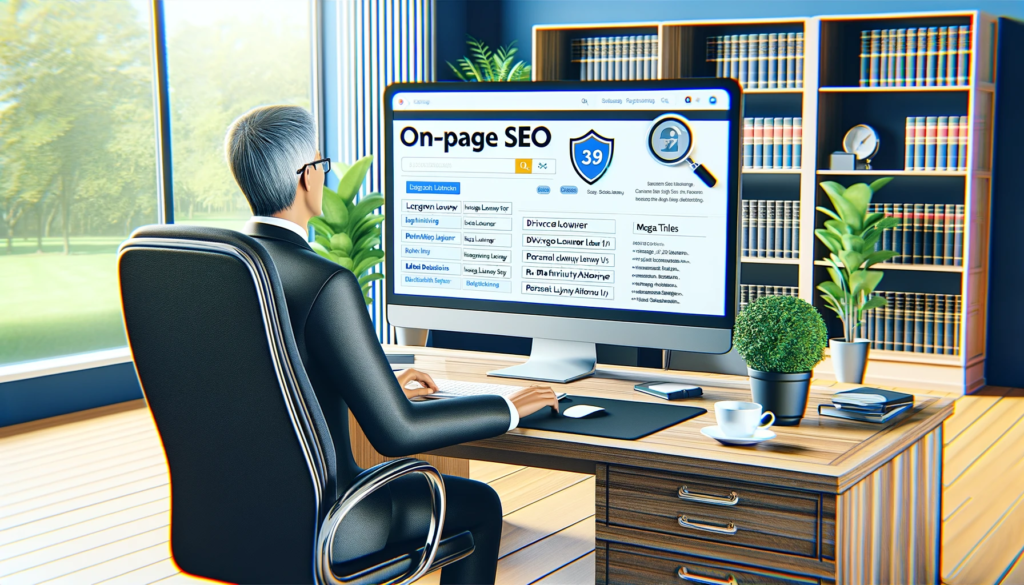With the evolving internet world, having a strong online presence is crucial for any business – and law firms are no exception. With more and more people turning to the Internet to find legal assistance, it’s essential for lawyers to make themselves visible to prospects. That’s where expert SEO efforts (or search engine optimization efforts) come into play. By optimizing their websites and online profiles, lawyers can increase their visibility on search Google or other search platforms and attract a steady stream of propective clients searching for their services. In this article, we will discuss some effective strategies that lawyers can implement to drive more clients through SEO techniques, focusing on the importance of a well-optimized website, the benefits of a Google Business Profile, and how to reach potential clients actively searching for legal expertise. So, if you’re a lawyer looking to grow your client base, keep reading to learn how to harness the power of SEO and enhance your online presence effectively.
Understanding the Importance of SEO for Lawyers

With the increasing competition in the legal industry, it has become essential for lawyers to invest in SEO to ensure their firm stands out from the crowd. SEO for lawyers refers to the process of optimizing a lawyer’s website to improve its visibility and ranking your web pages on Google results pages.
A well-designed law firm SEO strategy can have a significant impact on your online success. By implementing targeted keywords and creating quality content, lawyers can improve their website’s organic search rankings. This means that when someone searches for legal services online, your firm will have a better chance of appearing at the top of SERPs, increasing the likelihood of potential clients clicking on your website.
Legal marketing has evolved dramatically over the years, and SEO has become an essential component of any effective marketing campaign for lawyers. Traditional methods such as billboards and TV ads are rarely enough to reach your target audience in today’s digital landscape. By investing in a solid strategy, lawyers can reach clients who are actively searching for their services online, making it a more cost-effective and efficient way of marketing their practice.
Developing a specialized SEO plan that caters specifically to the needs of law firms is crucial for improving search visibility and rankings of your web pages. This approach focuses on aspects like technical SEO, website optimization, and customizing content to align with search algorithms, which are essential for standing out in a competitive digital landscape.
Furthermore, SEO for lawyers not only helps you attract new clients but also establishes your firm as a reputable and trustworthy source in the legal industry. Having a well-optimized website with informative content shows clients that you are knowledgeable and can provide them with the legal assistance they need. This can help build credibility and trust, ultimately leading to more conversions and increased success for your law firm.
Key Factors to Consider in SEO for Law Firms

One of the most effective ways to improve your visibility and attract clients is through SEO. However, SEO for law firms requires some specific considerations to ensure success.
Firstly, it’s essential to understand the unique nature of SEO for your legal clinic or firms. Potential clients seeking legal help typically rely on Google or similar to find information. Therefore, optimizing a your firm’s site and user experience is critical. This includes ensuring the website is accessible, uses a CMS that supports SEO, and incorporates local schema markup and a NAP profile for local SEO. Effective keyword optimization, link building outreach, and regular content creation are also vital to enhance the law firm’s website visibility and attract new clients. By incorporating meaningful keywords like “seo for law firms” and “other related” strategically throughout your website, you increase your chances of ranking higher in Google search result pages.
Secondly, one key SEO ranking factor to consider is local SEO. Most law firms serve clients in specific regions, so targeting local search is crucial. Make sure your website includes location-specific keywords and phrases, such as your city or region, to increase your visibility to upcoming clients in your area. Additionally, listing your firm on platforms like Google My Business can enhance your chances of showing up on local search results and attracting clients who are seeking legal assistance in your specific location.
Lastly, quality content is vital for successful SEO for law firms. Regularly updating your website with informative and engaging content not only increases your chances of your web page ranking higher in search but also helps build trust with potential clients. By providing valuable insights on legal topics, you showcase your expertise and position your firm as a trusted authority in your field. Additionally, sharing your content on social media platforms can further boost its visibility and attract new clients interested in your services.
Optimizing Your Website for Better Search Rankings
A key component of a successful online strategy is ensuring that your website is optimized for better rankings. By improving your website’s visibility in search, you can attract more search traffic and potential customers.
One way to improve rankings is by utilizing Google Maps. By claiming and optimizing your Google My Business listing, you can increase your chances of appearing in local search. Make sure your listing includes accurate contact information, opening hours, and a description of your business. Encourage customers to leave reviews, as this can boost your credibility and ranking.
Another important SEO ranking factor in optimizing your website is implementing effective SEO techniques. Conduct keyword research to identify relevant terms and phrases that users may search for. Incorporate these keywords naturally throughout your website’s content, including in titles, headings, and meta tags. Also, focus on creating high-quality, valuable content that is engaging for users. Optimizing your images with alt tags and compressing their file sizes can also improve your website’s loading speed, which is a contributing factor to search rankings.
Furthermore, it is crucial to regularly track and analyze your SEO efforts. Monitor your website’s performance using tools like Google Analytics to gain insights into your traffic sources, user behavior, and conversion rates. Adjust your SEO roadmap accordingly based on the data you collect. Additionally, stay up to date with the latest SEO trends and algorithm changes to ensure that your website stays optimized and ranks well.
On-Page SEO

One of the key elements in achieving better rankings is implementing effective on-page SEO for lawyers. By optimizing your lawyer website, you can improve its visibility on search results pages and attract clients who are actively looking for legal assistance.
To start with, it’s important to conduct thorough keyword research to identify the most relevant and high-value keywords for your law firm. Identify phrases that potential clients are likely to search for, such as “divorce lawyer in [your city]” or “personal injury attorney near me.” Including these keywords in strategic areas of your website, such as the page titles, meta descriptions, and headers, will help Google and other search engines understand the content and purpose of each page.
Another crucial aspect of on-page SEO is ensuring that your website is user-friendly and easy to navigate. A well-structured site with clear navigation menus and intuitive design will not only improve the user experience but also make it easier for search engines to crawl and index your content. Additionally, consider creating unique and engaging content for each page of your website. This will not only provide valuable information to your visitors but also give more content to index and rank.
Finally, it’s essential to regularly monitor and analyze the performance of your law firm’s SEO action plan. Use tools like Google Analytics to track the organic search traffic to your website, and identify any areas for improvement. Stay up to date with the latest SEO trends and algorithm updates to ensure that your website remains optimized and competitive.
Off-Page SEO

One important aspect is implementing effective off-page SEO strategies. Off-page SEO refers to the actions taken outside of your website that can impact your Google rankings. For lawyers, optimizing off-page SEO is essential to enhance their your firm’s online performance.
To start with off-page SEO, lawyers must focus on building high-quality backlinks. Backlinks are links from other websites that direct to your your firm’s site. Not only do these links drive traffic to your website, but they also signal Google that your website is reputable and trustworthy. To obtain quality backlinks, lawyers can collaborate with reputable legal directories, join industry-related associations, and contribute guest articles to authoritative legal blogs.
Another crucial off-page SEO plan for lawyers is optimizing their online reputation. Clients often turn to Google to find information about your firm’s reputation and credibility. Lawyers should actively monitor and manage their online reviews on platforms like Google My Business, Yelp, and Avvo. Encouraging satisfied clients to leave positive reviews can significantly boost your firm’s online credibility and visibility.
Lastly, engaging in social media and content marketing can greatly contribute to enhancing your firm’s off-page SEO. Establishing a strong social media presence not only helps foster relationships with new clients but also signals that your law firm is actively engaged online. Additionally, creating and sharing high-quality, informative content such as blog posts and educational videos can help showcase your expertise and attract traffic to your website.
Technical SEO for Lawyer’s Website

Technical SEO involves optimizing the technical aspects of a website to improve its visibility and ranking on search engine results pages. When it comes to a your firm’s website, implementing technical SEO strategies is essential for long-term SEO success.
One important factor to consider is website speed. Users today expect websites to load quickly, and Google or similar platforms prioritize fast-loading websites. Optimizing images, enabling browser caching, and reducing server response time are just a few ways to improve website speed and enhance user experience.
Another essential aspect of technical SEO is ensuring that your your firm’s website is mobile-friendly. With an increasing number of people using smartphones and tablets to browse the internet, it’s crucial to have a responsive website design that adapts to different screen sizes. Mobile-friendly websites not only improve user experience but also have better chances of ranking higher on search.
Additionally, website security is paramount for any your firm’s website. Clients trust lawyers with their sensitive information, and having a secure website can boost their confidence in your services. Implementing an SSL certificate, regularly updating software, and using secure hosting are some measures that can help protect your website from cyber threats.
Keyword Research For Lawyers

In SEO, keyword research plays a crucial role in ensuring the success of a website. For lawyers looking to boost their online presence, keyword research is a powerful tool that can significantly improve their law firm SEO performance.
To begin with, keyword research allows lawyers to identify the terms and phrases potential clients searching to search for legal help. By understanding the keywords people are searching for, lawyers can create high-quality content that caters directly to their target audience. This not only increases the chances of their website appearing in SERPs but also ensures that the content they create is relevant and valuable to their clients in making.
Furthermore, keyword research enables lawyers to uncover niche keywords that their competition may be overlooking. By finding these untapped keyword opportunities, lawyers can position themselves as industry experts in specific areas of law, setting themselves apart from other law firms. This can be particularly beneficial for lawyers who specialize in niche practice areas, as it allows them to target a specific audience and establish themselves as the go-to experts in their field.
Schema Markup for Law Firm Website

Schema markup is a code that you can add to your law firm help to understand the content better. It provides additional information about your website, such as the services you offer, your location, and even reviews. By implementing schema markup, you can enhance your website’s appearance in search engine results, making it more attractive to clients in making.
The use of schema markup is particularly important for attorney search engine optimization. By providing more detailed information about your website, you increase the likelihood of appearing in SERPs for relevant queries. This can help drive more targeted traffic to your law firm, resulting in more clients.
Implementing schema markup may seem daunting, but there are tools available that make it relatively easy, even for those without coding knowledge. By taking advantage of this powerful tool, you can improve the visibility of your law firm and stay ahead of the competition in the digital landscape. So, if you haven’t considered implementing schema markup for your law firm website, it’s time to do so and reap the benefits of enhanced rankings.
Core Web Vitals For Legal Websites

Core Web Vitals are a set of metrics introduced by Google to measure website performance, focusing on aspects such as loading speed, interactivity, and visual stability. These metrics play a significant role in determining a website’s ranking on SERPs. Law firm websites that prioritize meeting these standards are more likely to appear higher on SERPs, making them more visible to clients in making.
To optimize for Core Web Vitals, a website should pay attention to several factors. First, website loading speed is critical. Visitors expect fast-loading pages, so optimizing images, reducing server response time, and minimizing unnecessary scripting can significantly improve website speed. Second, interactivity is essential for a positive user experience. Law firm websites should prioritize responsiveness to user actions, ensuring that pages are smooth and snappy. Third, visual stability is important to prevent content from shifting, causing frustration to users. Care should be taken to avoid elements that cause unexpected layout shifts.
To further enhance visibility, law firm websites should also incorporate keywords and consider being listed on legal directories. By doing so, firms can increase their chances of reaching prospective clients when they search for specific legal assistance. Utilizing proper keywords effectively throughout the website’s content, meta tags, and headings can improve organic search rankings.
User Experience

User Experience (UX) is a critical aspect of any website or application. It refers to the overall experience a user has while interacting with a digital product. A good UX design focuses on enhancing user satisfaction by improving usability, accessibility, and overall enjoyment. Understanding user is key to delivering a positive UX. By analyzing user behavior and preferences, designers can create interfaces that meet their needs and expectations.
When it comes to online search, user intent plays a crucial role in determining the success of a website. Google and similar platforms are constantly evolving to provide more accurate results based on user graph. This means that websites need to prioritize delivering relevant content that aligns with what users are looking for. By focusing on user intent, businesses can optimize their websites and increase visibility in organic SERPs.
Another important aspect of UX is ensuring that users can easily find what they are looking for on a website. One way to improve this is by leveraging local directories. Local directories provide valuable information such as contact details, ratings, and reviews of businesses. By listing your business on relevant local directories, you can increase visibility and credibility among users. This not only improves the overall user experience but also helps drive more visitors to your website.
HTTPS Secured Server

The importance of HTTPS cannot be overstated, especially considering the nature of the information that is typically shared on their websites. From personal client details to confidential legal documents, legal firms handle sensitive data on a daily basis. By using HTTPS, they add an extra layer of security to their websites, minimizing the risk of data breaches and ensuring that client information remains confidential.
Furthermore, implementing HTTPS can also have a positive impact on a attorney firm’s SEO efforts. Google and similar platforms prioritize secure websites, giving them a higher ranking in SERPs. This means that with HTTPS-secured servers are more likely to be discovered by upcoming clients who are searching for law firm SEO services. By investing in the security of their website can improve their visibility and attract more qualified leads.
Fast Loading Website

When a firm’s website takes ages to load, users tend to become impatient and move on to other websites. This means that upcoming clients, who were genuinely interested in the firm’s services, are lost simply because of slow loading times. Moreover, a slow website can also damage a your firm’s reputation as it reflects poorly on their professionalism and ability to keep up with technology.
From an SEO perspective, website load speed plays a crucial role in determining its rankings. Google and other take into consideration the loading time of a website when ranking it. The slower the load time, the lower it will rank in organic search results, affecting its visibility to interested clients. This is where Google Analytics comes into play, allowing website owners to track their website’s performance and identify areas for improvement, including load speed.
To ensure a fast loading website, one can adopt several best practices. Optimizing images and reducing file sizes, minimizing the use of plugins and scripts, and leveraging browser caching are effective techniques. It is also worth considering a reliable hosting solution that can handle high traffic volumes without compromising speed.
Breadcrumbs

Breadcrumbs are an essential element of web design and navigation. They provide a clear and organized path for users to navigate through a website, making it easier for them to find the information they’re looking for. But did you know that breadcrumbs can also have a positive impact on your SEO?
One of the main reasons why breadcrumbs are important for SEO is because they improve the user experience. When users can easily navigate through your website, they are more likely to stay longer and explore more pages. This increased engagement can lead to higher search volume and indicate that your website is valuable to users.
From an SEO perspective, breadcrumbs are also beneficial because they provide context and keyword-rich anchor texts. By using right keywords in your breadcrumb links, you can help search engines understand the structure and content of your website. This can improve your website’s visibility in SERPs and potentially drive more organic traffic.
Fortunately, implementing breadcrumbs on your website doesn’t have to be complicated or expensive. There are several free tools available that can generate breadcrumbs automatically based on your website’s structure. These tools can save you time and effort while ensuring that your breadcrumbs are correctly implemented for both user experience and SEO purposes.
Moreover, breadcrumbs contribute to a cleaner, more hierarchical URL structure that search engines favor. By reflecting the site’s architecture within the URLs, each breadcrumb trail can help search engines crawl your site more effectively, understanding the relationships and relevance of pages in relation to one another. This structured approach not only enhances the clarity of navigation for users but also strengthens the thematic signals sent to search engines. Such clarity can reinforce your site’s thematic relevancy and improve indexation, which is pivotal in competitive SEO landscapes. Additionally, since breadcrumbs typically include the home page, they can help distribute page authority throughout your site, boosting the SEO performance of even lower-level pages.
Building Quality Backlinks for Law Firm SEO

Building quality backlinks is an essential aspect of any successful SEO campaign, especially for law firm website looking to boost their online presence. With the increasing competition in the legal industry, having a strong SEO roadmap is crucial to attract new clients. One way to improve your firm’s SEO is by acquiring high-quality backlinks from reputable websites.
When it comes to SEO, working with an experienced SEO agency, like Web Zodiac is highly recommended. We have the knowledge and expertise to implement effective strategies that will generate quality backlinks for your website. We can conduct thorough research to identify relevant websites and online directories where your law firm can be listed. By securing backlinks from authoritative sources in the legal field, your website can gain credibility and trust, leading to higher search rankings.
Guest Post

Guest posts are a fantastic way to showcase your expertise, build brand awareness, and increase traffic to your website. By writing an article as a guest author on another website, you can reach a new audience that may be interested in your products or services. Not only that, guest posts provide valuable backlinks which can significantly improve your website’s search rankings.
One of the key benefits of guest posting is the ability to target keywords related to your business. By strategically incorporating these target keywords in your article, you can increase the chances of appearing in Google SERPs for those specific terms. This can drive organic traffic to your website and attract potential customers who are actively searching for information related to your industry.
In addition to targeting keywords, guest posts also offer an opportunity to improve your website’s technical SEO. By following best practices such as optimizing title tags, meta descriptions, and headers, you can enhance the visibility and accessibility of your content. This, in turn, can positively impact your rankings and ultimately increase visitors.
So, guest posting is a valuable marketing strategy in any content marketing plan. It allows you to reach a wider audience and build credibility within your industry. By targeting keywords and implementing technical SEO techniques, you can maximize the impact of your guest posts and boost your website’s visibility in Google SERPs. So, start reaching out to relevant websites and offer to write a guest post today!
Ask Your Network

To start leveraging your network effectively, it’s important to identify your target keyword or the niche you want to focus on, such as “SEO for Attorney.” This will help narrow down your search and ensure you’re reaching out to the right people who can provide valuable insights or referrals in that specific area.
One way to approach your network is by simply asking if they know anyone who may be interested in your services. Whether it’s through an informal conversation, an email, or a social media post, let your network know what you do and how you can help interested clients with their SEO needs. By clearly articulating the value you bring to the table, you increase the chances of receiving relevant referrals.
Additionally, don’t underestimate the power of networking events and industry conferences. Attending these events can provide you with opportunities to meet new clients face-to-face and establish meaningful connections. Remember to have your elevator pitch ready and be proactive in initiating conversations. You never know who you might meet and how they might be able to help your business grow.
When it comes to expanding your client base, don’t overlook the potential of your network. By reaching out and asking for referrals or recommendations, you can tap into a valuable resource that may lead you to interested clients. Remember to identify your target keyword, leverage online and offline channels, and effectively communicate the value you offer. With these strategies in place, you’ll be well on your way to growing your SEO business for lawyers.
Alumni List

One of the key benefits of an alumni list is its ability to enhance the online presence of an educational institution. By sharing success stories and achievements of former students, schools can showcase their credibility and expertise to potential students and future employers. This not only attracts more visitors to the school’s website but also improves its ranking.
Implementing a well-structured alumni list can greatly improve a school’s visibility on search engine. By using fitting keywords such as “legal SEO” and “attorney SEO” in the content associated with the alumni list, schools can target specific search queries and increase their chances of appearing in relevant SERPs. This facilitates organic traffic to the website, which can then be converted into prospective students or clients.
Taking advantage of Google Search Console is essential to maximize the impact of an alumni list. This tool provides valuable insights into website performance, search visibility, and potential issues to address. By monitoring search analytics and optimizing the content on the alumni list accordingly, schools can ensure that they are reaching their target audience effectively and making the most of their digital presence.
Better Business Bureau (BBB)

The Better Business Bureau (BBB) is a trusted resource for consumers and businesses alike. With its mission to foster a fair and transparent marketplace, the BBB provides a platform for consumers to share their experiences and for businesses to showcase their commitment to ethics and customer satisfaction. One of the key features of the BBB is its accreditation program, which helps businesses build credibility and trust with consumers.
In addition to its role in enhancing visibility, the BBB also serves as a legal marketing tool for businesses. By being accredited by the BBB, businesses gain access to the BBB logo, which they can display on their website and marketing materials. This logo acts as a symbol of trust and integrity, assuring customers that the business adheres to high standards of professionalism and ethical business practices. This can be a powerful marketing asset, especially for businesses operating in competitive industries.
To maximize the benefits of being affiliated with the BBB, businesses should focus on optimizing their primary keyword within their BBB profile and reviews. By strategically incorporating their primary keyword in their profile description and encouraging customers to use it in their reviews, businesses can improve their rankings in search and attract more relevant traffic. This targeted approach to SEO can help businesses stand out in the digital landscape and drive more qualified leads.
Chamber of Commerce

The Chamber of Commerce is a powerful organization that plays a vital role in representing the interests of businesses in local communities. With the mission of promoting economic growth and creating a favorable business environment, Chamber of Commerce acts as a bridge between businesses, government entities, and the local community. It serves as a platform for networking, support, and advocacy for businesses, offering a wide range of resources and services to help them thrive.
Law firms, in particular, can greatly benefit from chamber memberships. Law firm SEO services are essential for attracting new clients to their websites and generating leads. By optimizing their online presence for local searches, can increase their chances of appearing in front of potential clients who are actively looking for legal help in their area. Chamber of Commerce offers additional exposure opportunities, allowing them to showcase their expertise and connect with the local business community. This can lead to valuable referrals and collaborations that can contribute to the growth and success of the law firm.
Local Listing

Why is local SEO important? Well, it’s all about getting your business to show up in SERPs when users search for a specific service in their area. By optimizing your website and online listings, you increase your chances of ranking higher in these results, making it easier for potential customers to find you.
For a law firm and attorneys, local SEO is particularly beneficial. With attorney SEO, you can target interested
clients within your location who are in need of legal saviour. By optimizing your online listings with relevant keywords and information, you can increase your visibility in search engine result pages, ultimately driving more traffic to your website and generating more leads.
Investing in local and attorney SEO is a cost-effective way to market your business to a targeted audience. By focusing on optimizing your online presence, you can ensure that your business is visible to prospective clients when they search for legal need in your area. So, whether you’re a small law firm or a solo practitioner, don’t underestimate the power of local listing and its impact on your business’s success.
Local News Sites

First and foremost, the site structure of a local news site is crucial for enhancing user experience and ensuring easy navigation. By organizing news categories, sections, and archives in a logical manner, readers can easily find the information they are looking for. Moreover, a well-structured site is favored by search engines, improving SEO and increasing the site’s visibility.
Link building is another vital aspect for any local news site. By acquiring high-quality backlinks from reputable sources, these sites can improve their rankings and attract more traffic. Engaging with local businesses, community organizations, and government agencies can be an effective way to obtain relevant backlinks. Furthermore, featuring guest posts or collaborating with other news outlets can also increase the site’s credibility and authority.
Additionally, incorporating law services into local news sites is becoming increasingly important. Local residents often seek legal advice and information, and by providing access to legal resources, local news sites can establish themselves as a trusted source for legal matters. This can be done by collaborating with local law firms or featuring articles and guides related to legal issues, ensuring that readers have a reliable platform to turn to for legal guidance.
Overall, it is crucial for local news sites to optimize site structure, implement effective link building strategies, and incorporate law services in order to thrive in the digital landscape. By focusing on these aspects, these sites can enhance user experience, improve rankings, and become a trusted source of information for local residents. In doing so, they fulfill their role in keeping communities well-informed and connected.
Law Niche Directories

With targeted clients relying on the internet to find legal help, it’s essential to optimize their websites and increase their visibility in SERPs. One effective way to achieve this is by listing your law firm in law niche directories.
Law niche directories are online platforms that specifically cater to legal professionals. They serve as a comprehensive resource for targeted clients looking for lawyers in specific practice areas and locations. By listing your law firm in these directories, you can increase your chances of getting found by individuals who are actively searching for legal assistance.
But how exactly do law niche directories benefit law firm SEO? Firstly, they provide high-quality backlinks to your firm’s website. Backlinks from reputable directories are regarded as authoritative by search engines, which can positively impact your website’s search engine ranking. Additionally, they help establish credibility and trust for your law firm, as being listed in reputable directories enhances your online reputation.
Furthermore, law niche directories provide an additional avenue for new clients to find your law firm. Many individuals turn to directories when conducting their search for legal services, and by having a presence in these directories, you increase the chances of being discovered. This can lead to more website traffic, higher conversion rates, and ultimately, more clients for your law firm.
In conclusion, law niche directories are a valuable tool to improve their visibility and attract new clients. By listing your law firm in these directories, you can gain high-quality backlinks, boost your search engine ranking, establish credibility, and increase your chances of being discovered by individuals in need of legal services. So, if you’re looking to enhance your firm’s website and reach a wider audience, consider exploring the opportunities offered by law niche directories.
Content Marketing Tactics for Law Firm SEO Success

One effective strategy is to create high-quality, informative blog posts that address commonly searched legal questions. By researching and understanding the keywords and phrases targeted clients are using, firms can optimize their content and increase their visibility in search engine results. This lawyer strategy not only boosts organic website traffic but also establishes the firm’s credibility and expertise.
Another content marketing tactic is to create engaging video content. Videos not only provide valuable information but also allow to showcase their personality and build a connection with new clients. By optimizing videos with right keywords and sharing them on various platforms, can attract a wider audience and increase their online presence.
Furthermore, one can leverage social media platforms to amplify their content reach. By sharing their blog posts, videos, and other relevant content on platforms like LinkedIn, Twitter, and Facebook, to engage with prospective clients and drive traffic to their website. These platforms also allow for targeted advertising, enabling to reach specific demographics and maximize the impact of their content marketing efforts.
To complement these strategies, it’s beneficial to incorporate client testimonials and case studies into the content. These elements serve as social proof, demonstrating the firm’s success and reliability in handling legal matters. Showcasing real-life examples and positive client feedback on the website and social media can significantly enhance trust and encourage prospective clients to initiate contact. Furthermore, regular updates and responsive interactions on these platforms ensure that the firm maintains a dynamic and approachable online presence, fostering stronger relationships with the audience.
Creating a User Persona

Let’s say you’re a personal injury lawyer looking to enhance your web page and attract more clients. By creating a user persona, you can better understand the needs and preferences of your target audience. For example, you may discover that your ideal client is a middle-aged individual who has recently been involved in a car accident and is seeking legal guidance. Armed with this information, you can tailor your content to address their specific concerns and provide the information they are looking for.
Creating a user persona also helps you define your content strategy. It allows you to identify the topics and keywords that are most relevant to your target audience. By understanding their pain points, you can produce content that offers valuable insights, answers their questions, and addresses their concerns. In the case of our personal injury lawyer, they could create blog posts or articles that discuss common types of accidents, steps to take after an accident, or how to choose the right lawyer. By creating content that aligns with the needs of their user persona, they can attract clients and establish themselves as a trusted authority in their field.
Additionally, optimizing the website for user experience is crucial in retaining the attention of prospective clients. This involves ensuring that the website is easy to navigate, mobile-friendly, and loads quickly. Incorporating interactive elements such as chatbots can provide immediate assistance to visitors, answering basic inquiries and guiding them to relevant sections of the site. By enhancing the user experience, the personal injury lawyer can reduce bounce rates and increase the chances of visitors taking action, such as filling out a contact form or scheduling a consultation. Ultimately, a well-optimized website not only supports the content strategy by making valuable information accessible but also helps convert visitors into clients by providing a seamless user experience.
Creating a Funnel For Advocacy

First and foremost, understanding the target audience is crucial. By analyzing data through Google Analytics, you can gain insights into the demographics, interests, and behaviors of your audience. This information will help you create content and messages that resonate with them, increasing the likelihood of conversions.
Next, it is important to carefully craft each stage of the funnel. For instance, if you are a personal injury lawyer advocating for safer driving, the first stage could be raising awareness about the dangers of distracted driving. This can be done through blog posts, social media campaigns, and informative videos. The next stage might involve offering resources and solutions, such as a downloadable guide on safe driving practices.
Throughout the funnel, it is essential to provide value and build trust with your audience. This can be done by delivering high-quality content, offering personalized support, and demonstrating expertise in the field. By consistently engaging with your audience and addressing their needs, you are more likely to convert them into advocates or customers.
Step 1 – Awareness: The first step in creating a funnel for advocacy is raising awareness. This involves utilizing various marketing strategies, such as SEO, to increase your online presence and reach a wider audience. SEO is an essential tool for increasing visibility in search engine results, so optimizing your web pages with proper keywords and high-quality content is crucial. By incorporating local SEO techniques, you can target specific geographic areas and connect with individuals who may be interested in your cause.
Step 2 – Interest: Once you’ve captured the attention of your target audience, it’s essential to nurture their interest and keep them engaged. This can be achieved through compelling storytelling, sharing informative content, and providing valuable resources. By presenting your cause in a relatable and impactful manner, you can further educate and inspire individuals to become advocates or customers. Additionally, leveraging social media platforms and building a strong online community can help foster a sense of belonging and encourage individuals to actively participate in your cause.
Step 3 – Action: The final step in your funnel is to encourage your audience to take action. This can involve signing a petition, making a donation, or engaging in volunteer work. Provide clear and straightforward calls-to-action, making it easy for individuals to contribute to your cause. Utilize analytics, free tool by Google to track the effectiveness of your funnel and make necessary adjustments to optimize conversions. Also, don’t forget to show appreciation and acknowledge the efforts of your advocates, as this can further strengthen their dedication and loyalty to your cause.
So, start building your funnel today, and make a lasting difference in the world.
Local SEO for Lawyers: Reaching Your Target Audience

One of the first steps in local SEO for legal professionals is optimizing your website. This involves using fitting keywords throughout your website’s content, including your practice areas, location, and contact information. By doing so, search engines will rank your website higher in relevant search queries, making it more likely for clients to find you.
Another crucial aspect of local SEO is creating and maintaining an accurate and comprehensive Google My Business profile. This profile provides essential information about your law firm, including your address, phone number, and hours of operation. By optimizing this profile and regularly updating it, you can improve your chances of appearing in the highly coveted local pack, the top three results displayed on Google SERPs.
In addition to optimizing your website and Google My Business profile, building quality backlinks to your website is another important factor in local SEO for advocates. Backlinks are links from other websites that direct users to your website. Law firms that have a high number of relevant backlinks from reputable sources are seen as more authoritative by search engines. This can boost your website’s ranking on SERPs, increase your visibility, and ultimately drive more traffic to your site.
Google My Business

Google My Business is a free platform offered by Google that allows businesses to create and manage their online presence across various Google platforms, including Google Search and Google Maps. With a Google business profile, a business can provide essential information to potential customers such as its address, phone number, website, and hours of operation.
An effective strategy is essential to attract clients and remain competitive in the digital landscape. And incorporating Google My Business into a law firm’s SEO strategy is a smart move. By optimizing their Google business profile with right keywords, law firms can increase their chances of appearing in the local search for people in need of legal services.
Moreover, Google My Business offers additional features that can further enhance a law firm’s visibility. For instance, firms can receive and respond to reviews from clients, which not only helps in building trust but also boosts their local search engine rankings. Additionally, Google My Business provides insights and analytics, allowing law firms to track important metrics like website clicks, phone calls, and direction requests.
Bing Places for Business

One of the key benefits of using Bing Places for Business is that it allows you to create a free listing for your law firm, making it easier for clients to find you. By ensuring that your business information, including your address, phone number, and website URL, is accurately listed on Bing Places, you increase your chances of appearing in local search results. This is especially important as more people are using voice search and digital assistants to find local businesses, and accurate listings can help boost your law firm’s visibility.
In addition to creating a free listing, Bing Places for Business also offers features that can enhance your law firm’s SEO efforts. For instance, it allows you to add keywords that are relevant to your practice areas, such as “law firm SEO guide” or “link building.” By including these keywords in your listing, you increase the likelihood of appearing in search engine results pages (SERPs) when prospective clients search for those terms. This can drive more organic traffic to your website and help establish your law firm as an authoritative source in your practice areas.
Apple Business Connect

Apple Business Connect is an innovative solution designed to help businesses connect with their customers on a deeper level. With its advanced features and user-friendly interface, this platform offers a seamless experience for both businesses and their clients. One of the standout features of Apple Business Connect is its integration with Google Search Console, which allows businesses to track their website’s performance and optimize their online presence.
Another key advantage of Apple Business Connect is its focus on building strong relationships with clients. By providing businesses with an efficient communication channel, this platform allows them to engage with their clients in a more personalized and meaningful way. From sending targeted promotions to providing real-time customer support, Apple Business Connect helps businesses nurture their client base and foster long-term loyalty.
Near Me Keywords

Incorporating “near me” keywords into your content can greatly improve your chances of reaching your target audience.
“Near me” keywords are phrases that people use when searching for businesses or services in their local area. For example, if someone is looking for a law firm, they might search for “law firm near me”. By including these primary keywords in your website’s content, you can optimize your site to appear higher in SERPswhen someone searches for a relevant service in their immediate vicinity.
This strategy is especially effective for most law firms. Prospective clients are often looking for legal assistance close to their location, whether it’s for a personal injury case, a divorce, or any other legal matter. By including “near me” keywords throughout your website, you are increasing the likelihood of your law firm appearing in SERPs when someone is seeking legal services in your area.
Review Management

One effective way to handle review management is to partner with a reputable law firm SEO company, like Web Zodiac. These agencies have the expertise and resources to optimize your online presence and ensure that your positive reviews rank highly in organic search results. By utilizing their knowledge of SEO techniques, they can help your business stand out from the crowd and attract more customers.
A law firm, for example, can greatly benefit from an SEO agency’s skills. With the help of a law firm SEO guide, these agencies can enhance the firm’s online reputation by strategically managing client reviews. By emphasizing positive feedback and addressing any negative comments promptly and professionally, they can impress potential clients and establish the law firm as a trusted and reliable source in their field.
Mobile Optimization Strategies for Lawyers

First and foremost, invest in SEO for law firms. SEO is the process of improving your website’s visibility on SERPs. By implementing the right keywords and optimizing your content, you can improve your website’s ranking and drive more organic traffic. Focus on incorporating relevant keywords in your website’s copy, meta descriptions, and title tags to enhance your online presence.
Next, pay attention to the design and layout of your website. Mobile users expect a seamless browsing experience with easy navigation and quick loading time. Optimize your images, minimize redirects, and enable browser caching to speed up your website. Additionally, ensure your buttons and forms are easily clickable and inputting information is hassle-free on mobile devices.
Lastly, consider launching an SEO campaign specifically tailored for mobile users. Since mobile searches differ from desktop searches, you need to understand what mobile users are looking for and adapt your content accordingly. Create mobile-friendly content that is concise, informative, and easy to read. Consider incorporating mobile-specific features such as click-to-call buttons or maps to make it easier for visitors to contact your law firm.
Monitoring and Measuring Success in Lawyer SEO Strategy

Monitoring and measuring the success of lawyer SEO involves tracking key performance indicators (KPIs) to evaluate the effectiveness of the strategies. One such KPI is organic search traffic, which measures the number of visitors coming to a law firm’s website through Google search results. By analyzing the trends and patterns in organic traffic, law firms can gain valuable insights into the success of their SEO efforts.
Another important KPI to monitor is keyword rankings. By tracking the rankings of specific keywords relevant to the law firm’s services, it becomes possible to assess whether the SEO strategies are helping the firm appear in top search results. Additionally, tracking the conversion rate, or the percentage of website visitors who take a desired action (such as filling out a contact form or making a phone call), can provide insights into the effectiveness of the website’s design and content.
To effectively monitor and measure SEO success, one can utilize various tools and software. These tools often provide comprehensive analytics and reporting features that allow for in-depth analysis of the SEO performance. By regularly reviewing and tweaking the strategy based on the data collected, one can ensure that they are maximizing their visibility and attracting the right audience through SEO.
Staying Ahead with Advanced SEO Techniques for Law Firms

One of the key aspects of SEO for attorney firms is optimizing their website with targeted keywords. By using relevant keywords and phrases that potential clients are searching for, firms can ensure that their website appears in search results. This increases the likelihood of attracting organic traffic and capturing the attention of potential clients.
Another important aspect of SEO for law firms is creating high-quality and informative content. By consistently producing valuable content related to their areas of expertise, and can establish themselves as authoritative sources and build trust with clients. This not only improves the visibility of the website but also enhances the overall user experience.
Additionally, they can benefit from utilizing advanced link-building techniques. Building high-quality backlinks from reputable websites in the legal industry can significantly improve the website’s authority and credibility, leading to improve search engine rankings. Collaboration with other professionals or guest posting on relevant platforms can help them gain valuable backlinks.


0 Comments